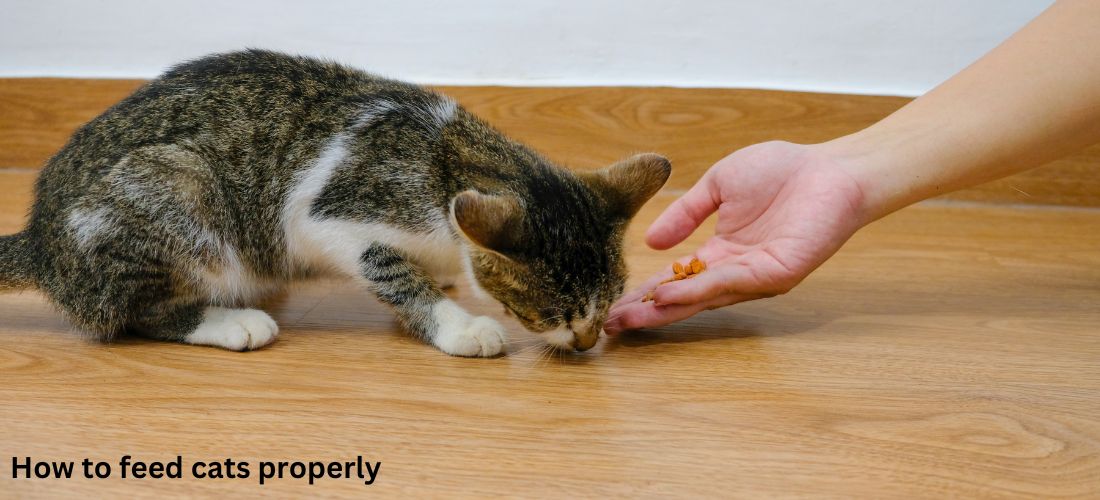To feed cats properly, veterinary advice emphasizes selecting nutritious cat food. This ensures they receive essential nutrients for optimal health. Consistency in feeding schedules and portion control are crucial. Understanding dietary needs based on age, health, and lifestyle helps maintain their well-being.
How to Correctly Transition Cat Foods?
When transitioning your kitty to a new type of food, it’s important to do it slowly to avoid any stomach upset. Start by mixing a small amount of the new food with the old, gradually increasing the ratio over several days. If you have concerns about your cat’s diet, it’s always best to talk to your veterinarian for personalized advice.
Cats may have different nutritional requirements depending on their age and weight, so it’s important to choose the right food for your cat. Kittens require a higher protein and calorie content compared to adult cats. Wet food is often recommended for cats to help maintain their healthy weight and hydration levels.
When it comes to feeding time, having a consistent feeding schedule can help your cat maintain a healthy body weight. Avoid free feeding and instead portion out the amount of food your cat should eat according to their feeding routine. Make sure to always have fresh water available in a clean water bowl.
What is the proper way to feed a cat?
When it comes to feeding your cat, it’s important to keep your cat’s health in mind. Make sure to provide a balanced cat diet with the necessary nutrients they need. Choose the best food and water bowls for your cat to eat from. Talk to your vet about choosing a food that is best for your cat.
Consider your cat’s body condition and adjust their food intake accordingly to prevent obesity. Regular feeding times will help control how much your cat is eating. Avoid feeding your cat homemade food unless approved by a professional. Encourage your indoor cat to drink water by offering a clean water bowl alongside their food.
How to feed your cat?
When it comes to feeding your cat, it is important to offer a balanced diet that includes a mix of canned and solid food. Keep your cat healthy by giving them kitten food when they are young, and transitioning to adult cat food as they grow. Make sure to provide fresh water in a clean food bowl to encourage your cat to drink and stay hydrated. The food should be refrigerated if not consumed immediately to maintain freshness.
Cats prefer to eat small, frequent meals throughout the day, so consider leaving a portion of food available at all times for your cat to graze on. However, free feeding can lead to weight gain and obesity, so it is important to feed control officials recommended portions of food to prevent your cat from becoming overweight. Cats prefer running water and may drink more if it is provided in a cat’s food or a drinking fountain.
What is the healthiest way to feed a cat?
When it comes to your cat’s health, it is important to give your cat the healthiest diet possible. The Association of American Feed Control Officials recommends feeding your cat canned food as it is found to be the best option for weight management. Canned food also contains essential nutrients that your cat can eat to stay healthy.
Make sure to adjust your cat’s diet to fit their daily needs. You can feed your cat several times a day to ensure they are getting enough food. It’s important to watch the amount you feed your cat and make sure the food is available at all times.
Be sure to get your cat a pet’s food that your cat likes. Look for food that is approved by the Association of American Feed Control Officials to ensure it meets the necessary standards. This will help in maintaining your cat’s overall health and well-being.
How much should my cat eat?
Cat health is crucial when it comes to your cat. It’s important to monitor and regulate your cat’s daily food intake to ensure they are getting the proper nutrients they need. Remember, certain vitamins and minerals are found only in animal products, which are essential for your cat’s overall health.
How much food should cats eat a day?
Cats should typically eat 2-4 small meals a day, depending on their size, age, and activity level. It’s generally recommended to feed an adult cat about 24-35 calories per pound of body weight per day. It’s important to consult with your veterinarian to determine the best feeding schedule and portion sizes for your cat.
What should I feed my cat?
It is important to provide your cat with a balanced diet that includes high-quality cat food. Look for options that are specifically formulated for cats to ensure they are getting all the necessary nutrients. Avoid feeding them human food, as some items can be harmful to their health.
Consult with your veterinarian to determine the best diet for your cat based on their age, weight, and any health conditions they may have. Always provide fresh water for your cat to drink and monitor their eating habits to ensure they are maintaining a healthy weight.
Is it okay to feed cats dry food only?
Many experts recommend a combination of wet and dry food to ensure proper hydration and nutrition. Dry food can be convenient and help with dental health, but it may not provide enough moisture for cats. Consider incorporating wet food into their diet for a well-rounded nutrition plan.
What to do if your cat isn’t eating?
If your cat isn’t eating, it could be a sign of a health issue. First, make sure they have access to fresh water. Try offering them different types of food to see if their appetite improves. If the issue persists, it’s best to consult with a veterinarian to rule out any serious problems.
Additionally, monitor your cat’s behavior for any other signs of illness, such as lethargy or vomiting. Keep track of any changes in their routine or environment that may be causing stress. Encouraging them to eat small meals throughout the day can also help stimulate their appetite.
Feeding pregnant cats and mums feeding kittens
Feeding pregnant cats requires a diet that is high in protein, essential nutrients, and vitamins to support the growth of the kitten inside. It is important to provide smaller, more frequent meals to prevent overeating and ensure the health of the expecting mother.
Mums feeding kittens involves producing enough milk to nourish her litter and provide them with the necessary nutrients for growth. It is crucial for the mother cat to have access to clean water and a balanced diet to support her own health and the health of her kittens.
Cat Feeding Mistakes: Feeding Only Dry Food
Cat Feeding Mistakes: Feeding Only Dry Food can lead to health issues such as dehydration and urinary tract problems. Cats need moisture in their diet for optimal kidney function. A diet solely consisting of dry kibble may not provide enough hydration, leading to potential health issues. It’s important to provide a balanced diet with wet food as well.
5 Tips for New Cat Owners: How to Feed Cats Properly
1. Prepare your home: Cat-proof your home by removing any toxic plants, small objects that could be swallowed, and securing windows and balconies. Create designated feeding and litter areas to establish a routine for your new feline friend.
2. Provide scratching posts: Cats need to scratch to maintain healthy claws. Invest in a sturdy scratching post to prevent them from damaging furniture or carpets.
3. Schedule regular vet visits: Keep your cat healthy by scheduling regular check-ups with a veterinarian. Vaccinations, flea prevention, and dental care are all important aspects of responsible pet ownership.
4. Enrich their environment: Keep your cat mentally stimulated by providing toys, climbing structures, and hiding spots. Cats are curious animals that need mental and physical stimulation to thrive.
5. Show patience and love: Building a bond with your new cat takes time. Be patient as they adjust to their new surroundings and show them love and affection to build a trusting relationship. Remember, every cat is unique and will have their own individual personality.
Is it Time To Switch My Feline’s Food?
It may be time to consider changing your cat’s food if they are experiencing digestive issues, skin allergies, or weight gain. Consult with your veterinarian before making any changes to ensure you are meeting your cat’s specific nutritional needs.
Introducing a new food gradually can help prevent digestive upset and allow your cat to adjust to the new diet. Look for high-quality cat food with ingredients that support your feline friend’s overall health and well-being.
Monitor your cat’s response to the new food, including their stool consistency, energy levels, and coat condition. If you notice any negative changes, consult with your veterinarian to determine the best course of action for your cat’s diet.
Preparing for Travel With or Without Your Feline Friend
When preparing to travel with your feline friend, make sure to pack their favorite toys, bedding, and enough food and water. Consider bringing a familiar blanket or shirt with your scent to help them feel more comfortable during the journey.
On the other hand, if you are traveling without your cat, arrange for a trusted pet sitter or boarding facility. Leave detailed instructions about your cat’s feeding schedule, medications, and any other important information to ensure they are well taken care of in your absence.
How to Feed Cats properly in a Multiple-Cat Household?
Feeding cats in a multiple-cat household can be a challenge, but there are strategies to ensure each cat gets the nutrition they need. Separate feeding stations can help prevent food aggression and allow each cat to eat at their own pace. Utilizing timed feeders can also help manage feeding times and prevent one cat from eating all the food. Consult with a veterinarian to determine the best feeding plan for your multi-cat family.
Final thoughts about How to feed cats properly
Above veterinary advice on cat food ensures cats receive balanced nutrition essential for their health. By adhering to recommended feeding practices and monitoring their diet closely, cat owners can promote longevity and well-being in their feline companions.

